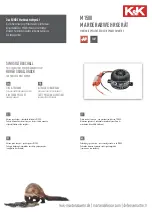
1 – 10
Overview
turning through pins 3 and 4. This connection may carry as much
as 4.5 A at full current. Be careful to wire the TEC sense connection
(pins 10 and 12) independently to the TEC module, so that any ohmic
drop across the current leads does not introduce errors in the voltage
sensing.
Note the polarity convention for the TEC module: when
positive
current flows from the TEC
+
terminal, through the TEC element,
and returning through the TEC
−
terminal, then the TEC element
will be actively
cooling
the load.
The sensor connection is ideally suited to 4-wire (Kelvin-lead) con-
nection; however, satisfactory results may be obtained in some cases
by leaving the sense connections, pins 14 and 15, disconnected. If
possible, pin 14 should be tied to pin 7, and pin 15 to pin 8, either
near the temperature sensor, or else at the cable connector.
See Figure 2.3 in section 2.1.3 for examples.
1.5.5
Remote interface connections
An IEEE-488 (GPIB) interface is standard on all LDC500s. The GPIB
address can be configuredfrom the Utility menu (see section 3.4.1.4).
16
The default GPIB address is 2.
An RJ-45 10
/
100 base-T Ethernet connection is also standard. TCP
/
IP
settings for IP address, netmask, and default gateway can all be set
17
from the Utility menu (section 3.4.1.3)
Finally, a 9-pin female subminiature-D connector provides an RS-232
interface (wired for DCE). The interface operates at 8-bits data, 1 stop
18
bit, no parity, and no flow control. The baud rate can be configured
from the Utility menu (section 3.4.1.6). The default baud rate is 9600.
1.6
User Interface
1.6.1
Hard controls
Four principal functions of the LDC500 are controlled by dedicated
front-panel keys, and are always accessible independent of menu
navigation.
1.6.1.1 Laser on/off
The [LASER On
/
O
ff
] button, under the “Laser Diode Control” block,
toggles the laser diode current source on and o
ff
. When turning the
9
laser on, a 3 s safety delay is imposed before the circuitry is engaged.
LDC500 Series Laser Diode Controllers
















































